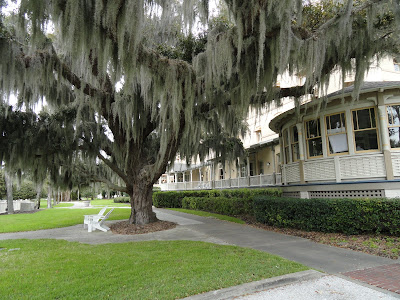











You are probably getting more of a history lesson than you expected but this part of the States is steeped in wonderful stories of time gone by.
Jekyll Island is an island off the coast of the U.S. state of Georgia, in Glynn County; it is one of the Sea Islands and one of the Golden Isles of Georgia.
Jekyll Island is an island off the coast of the U.S. state of Georgia, in Glynn County; it is one of the Sea Islands and one of the Golden Isles of Georgia.
The district consists of a number of buildings from the late nineteenth and early twentieth centuries. The island is also full of wildlife, consisting of many different mammals, reptiles and birds living and breeding in the island's inland marshes.
In the mid-section of the river side of the island is a 240-acre (0.97 km2) Historic District where most of the buildings from the Jekyll Island Club era still stand, most in remarkable preservation. The centerpiece of the grounds is the enormous Jekyll Island Club Hotel, a two-winged structure that contains numerous suites for rental, including a beautiful presidential suite that contains the 3-story turret on the front of the building. Thirty-three buildings from the late nineteenth and early twentieth centuries surround the hotel, with many being mansion-sized cottages. Rooms in some of these cottages are for rent, while others exist as museums, art galleries, or bookstores. The hotel is listed in the National Register of Historic Places. The historic district itself has been listed as a National Historic Landmark District since 1978.[4]
Christophe du Bignon and his family arrived here in 1792. The family came to the United States in order to escape the French Revolution, which devastated provincial families like the du Bignons. The plantation that du Bignon owned on Jekyll was very prosperous and grew cotton as its main crop. Christophe du Bignon also introduced slavery to the island. Christophe died in 1825 and ownership passed on to his son Henri Charles Du Bignon. Under the new ownership of Henri Charles the plantation continued to prosper, as evidenced by the 1850 census.
On November 28, 1858, fifty years after the importation of slaves to the United States was made illegal, the ship The Wanderer landed on Jekyll Island with 465 slaves. This was the next-to-last successful shipment of slaves to American soil from Africa.
However, by 1860, there was a great decline in the productivity on Jekyll. By 1862 when Union Army troops arrived, the Du Bignon plantation was completely deserted. After the American Civil War ended, the Du Bignon family returned to the island. Henri Charles divided the island up among his four children.
In the late 1870s John Eugene Du Bignon became owner of property on the island. He had bought the southern third of the island from his uncle’s estate, intending to establish a home there.
Du Bignon, who had inherited the southern third of the island from his father, purchased the rest of the island from his siblings with the help of his brother-in-law Newton Finney and an investor. Their plan to sell the island as a winter retreat for the wealthy came to fruition on February 17, 1886, and the clubhouse was completed in January 1888. Fifty-three members purchased shares for $600 each, and a limit of 100 members was imposed to preserve the club's exclusivity.[6]
Du Bignon, who had inherited the southern third of the island from his father, purchased the rest of the island from his siblings with the help of his brother-in-law Newton Finney and an investor. Their plan to sell the island as a winter retreat for the wealthy came to fruition on February 17, 1886, and the clubhouse was completed in January 1888. Fifty-three members purchased shares for $600 each, and a limit of 100 members was imposed to preserve the club's exclusivity.[6]
From 1888–1942 the club opened every January, except a few because of Yellow Fever outbreaks, to accommodate some of the world's wealthiest people. Members and their families enjoyed activities such as biking, hunting, horseback riding, and tennis, and frequented the north beaches. Some of the more esteemed members built mansion-sized cottages that still stand in excellent condition today. During the Great Depression the club experienced financial difficulties, and by the time the United States entered World War II the era of the Jekyll Island Club was over.
The state of Georgia condemned the island in 1947 and paid the remaining members a total of $675,000.[8]
No comments:
Post a Comment